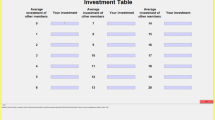Abstract
This paper compares contributions to an experimental public good across the United States and Czech Republic, using a design that allows us to distinguish between altruism and decision error. Czech subjects contribute significantly more than American subjects, and further analysis reveals that this result cannot be attributed to the confounding effects of gender or decision error. Instead, preferences for altruism appear to differ across groups: Czechs are more altruistic than Americans and men are more altruistic than women.
Similar content being viewed by others
References
Anderson, S. P., Goeree, J. K., & Holt, C. A. (1998). A theoretical analysis of altruism and decision error in public goods games. Journal of Public Economics, 70, 297–323.
Andreoni, J. (1995). Warm-glow versus cold-prickle: the effects of positive and negative framing on cooperation in experiments. The Quarterly Journal of Economics, CX(1), 1–21.
Brandts, J., Saijo, T., & Schram, A. (2004). How universal is behavior? A four country comparison of spite and cooperation in voluntary contribution mechanisms. Public Choice, 119, 381–424.
Brown-Kruse, J., & Hummels, D. (1993). Gender effects in laboratory public goods: do individuals put their money where their mouth is? Journal of Economic Behavior and Organization, 22(3), 255–267.
Burlando, R., & Hey, J. D. (1997). Do Anglo-Saxons free-ride more? Journal of Public Economics, 64, 41–60.
Cadsby, C. B., & Maynes, E. (1998). Gender and free riding in a threshold public goods game: experimental evidence. Journal of Economic Behavior and Organization, 34, 603–620.
Cadsby, B., Hamaguchi, Y., Kawagoe, T., Maynes, E., & Song, F. (2007). Cross-national gender differences in behavior in a threshold public goods game: Japan versus Canada. Journal of Economic Psychology, 28(2), 242–260.
Cason, T. N., Saijo, T., & Yamato, T. (2002). Voluntary participation and spite in public good provision experiments: an international comparison. Experimental Economics, 5, 133–153.
Dawes, R. M., McTavish, J., & Shaklee, H. (1977). Behavior, communication, and assumptions about other people’s behavior in a commons dilemma situation. Journal of Personality and Social Psychology, 35(1), 1–11.
Goeree, J. K., Holt, C. A., & Laury, S. K. (2002). Private costs and public benefits: unraveling the effects of altruism and noisy behavior. Journal of Public Economics, 83, 255–276.
Goeree, J. K., Holt, C. A., & Smith, A. M. (2005). An experimental examination of the volunteer’s dilemma. Working Paper.
Henrich, J., Boyd, R., Bowles, S., Camerer, C., Fehr, E., Gintis, H., & McElreath, R. (2001). In search of homo economicus: behavioral experiments in 15 small-scale societies. The American Economic Review, 91(2), 73–78.
Herrmann, B., Thöni, C., & Gächter, S. (2008). Antisocial punishment across societies. Science, 319, 1362–1367.
Hofstede, G. (2001). Culture’s consequences: comparing values, behaviors, institutions, and organizations (2nd edn.). Thousand Oaks: Sage.
Hofstede, G., & Hofstede, G. J. (2005). Cultures and organizations: software of the mind. New York: McGraw-Hill.
Ledyard, J. O. (1995). Public goods: a survey of experimental research. In J. H. Kagel & A. E. Roth (Eds.), The handbook of experimental economics (pp. 111–194). Princeton: Princeton University Press.
Nowell, C., & Tinker, S. (1994). The influence of gender on the provision of a public good. Journal of Economic Behavior and Organization, 25, 25–36.
Ockenfels, A., & Weimann, J. (1999). Types and patterns: an experimental East-West-German comparison of cooperation and solidarity. Journal of Public Economics, 71, 275–287.
Poppe, M., & Utens, L. (1986). Effects of greed and fear of being gypped in a social dilemma situation with changing pool size. Journal of Economic Psychology, 7, 61–73.
Roth, A. E., Prasnikar, V., Okuno-Fujiwara, M., & Zamir, S. (1991). Bargaining and market behavior in Jerusalem, Ljubljana, Pittsburgh, and Tokyo: an experimental study. The American Economic Review, 81(5), 1068–1095.
Seguino, S., Stevens, T., & Lutz, M. (1996). Gender and cooperative behavior: economic man rides alone. Feminist Economics, 2(1), 1–21.
Sell, J. (1997). Gender, strategies, and contributions to public goods. Social Psychology Quarterly, 60(3), 252–2650.
Solow, J. L., & Kirkwood, N. (2002). Group identity and gender in public goods experiments. Journal of Economic Behavior and Organization, 48, 403–412.
World Bank (2008). 2005 International comparison program: tables of final results. Washington: World Bank.
Author information
Authors and Affiliations
Corresponding author
Electronic Supplementary Material
Below is the link to the electronic supplementary material.
Rights and permissions
About this article
Cite this article
Anderson, L.R., DiTraglia, F.J. & Gerlach, J.R. Measuring altruism in a public goods experiment: a comparison of U.S. and Czech subjects. Exp Econ 14, 426–437 (2011). https://doi.org/10.1007/s10683-011-9274-8
Received:
Accepted:
Published:
Issue Date:
DOI: https://doi.org/10.1007/s10683-011-9274-8




